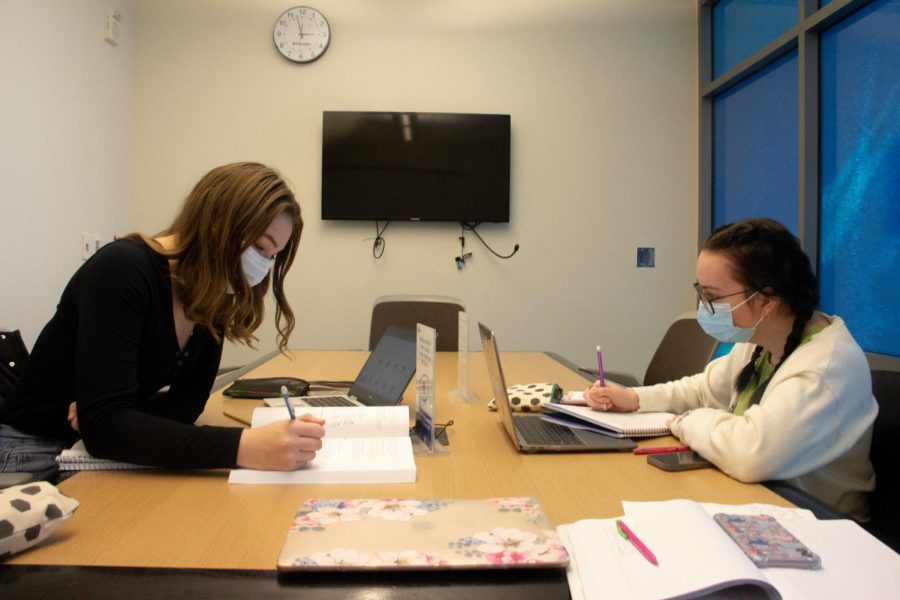GV area COVID booster vaccinations remain low as few receive updated shot
Oct 17, 2022
A recent survey from the Kaiser Family Foundation (KFF) has found that a majority of Americans have not received the updated bivalent booster and do not plan on doing so. As of a few weeks ago, the KFF estimated that roughly 5% of the population had obtained their additional booster which rolled out around Labor Day. This is a stark contrast to the original COVID shots, which facilitated the vaccination of about 68% of Americans and had individuals lined up for blocks at makeshift vaccination centers like the Devos Place Convention Center in downtown Grand Rapids.
The same decline can be seen in the Grand Valley State University area, where local vaccination rates have continued to plummet.
Before the introduction of the newest booster, local vaccination rates had already begun to decline as more shots were created. According to Michigan’s COVID-19 Vaccine Dashboard, while approximately 60% of fully vaccinated individuals in Ottawa County have received at least one booster shot, only about 38% of all residents eligible for vaccination have done the same.
Supply hasn’t been as large of a factor in the limited spread of the bivalent booster. Rather, low vaccination has stemmed from low demand. The vaccination is widely available in pharmacies nationwide and is paid for by the government, making it free and accessible.
However, according to the KFF study, one-third of surveyed adults reported that they planned on receiving the shot “as soon as possible.” The study reported equal levels of surveyed adults not being eligible for the vaccination due to being unvaccinated or partially vaccinated.
Low vaccination rates could exist for a variety of reasons. Naturally, Americans that have declined to receive the COVID-19 vaccine thus far will most likely continue doing so for personal reasons. Another factor may be the perception that the pandemic has come to an end. Even President Biden suggested this during his interview with 60 Minutes.
“If you notice, no one’s wearing masks,” Biden said in the interview. “Everybody seems to be in pretty good shape, and so, I think it’s changing. And I think this is a perfect example of it.”
As day-to-day operations have slowly begun to feel normal again, many overlook the fact that the virus still claims roughly 400 American lives per day, according to the CDC.
Speaking from her personal view, Emily Orewiler, a pharmacy technician at Parkview Regional Medical Center in Fort Wayne, Indiana, said that regional perception may be influenced by lingering vaccination fear.
“I feel like people aren’t trusting the booster,” Orewiler said. “I also think that people believe they don’t need it if they already got their first and second shot.”
Orewiler said that vaccination numbers may not stay low for long.
“Honestly, I didn’t know that less people were getting the vaccine,” Orewiler said. “I make them a lot in the pharmacy, so I figured everyone was (receiving them).”
Fellow healthcare worker Gabrielle England reflected on her experiences with the pandemic from an assisted living standpoint. England said that many Americans may be experiencing COVID fatigue.
“When it comes to COVID in the U.S., I think people are just over it more or less,” England said. “We’ve gotten three vaccinations already, so maybe people feel that they’ve done enough. I support being vaccinated, especially when you’re working in a place where there are a lot of immunocompromised people, but it’s not always the first thing on people’s minds.”
England also said that many have not felt the pressure to obtain the vaccination yet because the benefits are not as drastic as the previous shots.
“Some might say that Omicron isn’t much worse than a common cold or the flu which, going back to the point of inconvenience, they don’t feel they need to be protected against such mild symptoms,” England said.
Regardless of opinions on the bivalent booster, it appears that, for now, the choice will ultimately remain up to the individual as it is not widely required by employers or higher education institutions.
While there are both positive and negative factors on both sides of opinion, health officials continue to stress the importance of individuals doing their own research and consulting with their physicians before making any decisions about their vaccination status.






















